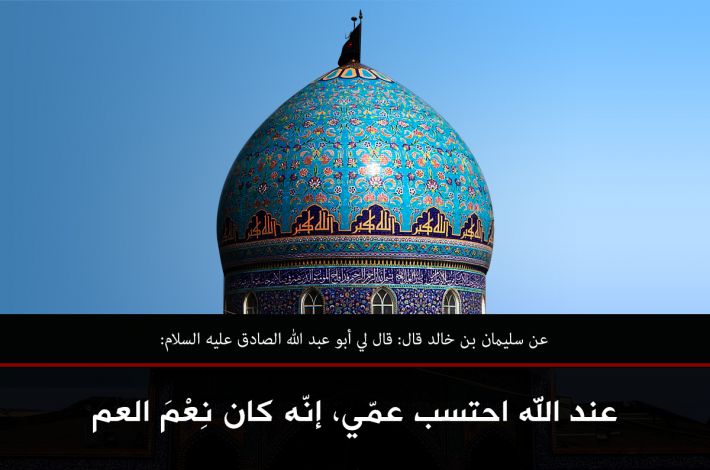On the second of Safar 122 AH was the martyrdom of the killed and crucified Abu al-Hussayn Zayd Ash-Shaheed [The martyr] son of Imam Ali as-Sajjad son of Imam Aba Abdillah al-Hussayn son of the Commander of the Faithful; Imam Ali son of Abi Taleb (Allah's prayers be upon them all), whose shrine is located in the province of Babylon, Kifl village that is far 30 kms from Kufa.
He (peace be upon him) was born in the year 57 AH, and grew up in the House of prophecy in the lap of his father Imam Zayn Al-'Abideen (peace be upon him) learning from him. Some narrations stated that his name was given by the Messenger of Allah (Allah's prayers be upon him and his holy Household). He was given the title of "Haleef al-Quran" [the ally of the Quran] as he was permanently reciting Quran and performing his prayers in the Masjid.
He reached a supreme level of knowledge and he (peace be upon him) was one of the scholars of his time, as he learned from his father Imam Zayn al-'Abideen (peace be upon him), and from Imam al-Baqer and Imam as-Sadeq (peace be upon both of them), from whom he learned the secrets of the finest knowledge.
Imam as-Sadeq (peace be upon him) said: "Zayd was a scholar and was the most honest." He was pious, worshipper, eloquent, generous and courageous, raising his sword to enjoin what is good and forbade evil, and to avenge the martyrdom of his grandfather al-Hussayn (peace be upon him). And his eloquence in speeches sounded like the eloquence of his grandfather Ali Ibn Abi Taleb (peace be upon both of them).
As narrated by Imam al-Hussayn (peace be upon him): "The Holy Prophet put his sacred hand on my back and said: 'O Hussayn, it will not be long until a man will be born among your descendants. He will be called Zayd; he will be killed as a martyr. On the day of resurrection, he and his companions will enter heaven, setting their feet on the necks of the people.'"
Historians recorded that when Hisham ibn Abd al-Malik became the caliph, he committed many atrocities. With regard to the Bani Hashim, he was particularly cruel. At last, Zayd ibn Ali, well known as a great scholar and a pious theologian, went to see the caliph to seek redress for the grievances of the Bani Hashim.
As soon as Zayd arrived, the caliph, instead of greeting him as a direct descendant of the prophet, abused him with such abominable language that cannot be repeated. Because of this disgraceful treatment, Zayd left Syria for Kufa, where he raised an army against the Bani Umayyah.
The governor of Kufa, Yusuf ibn 'Umar Thaqafi came out with a huge army to face him. Zayd recited the following war poem: "Disgraceful life and honourable death: both are bitter morsels, but if one of them must be chosen, my choice is honourable death."
Although he fought bravely, Zayd was killed in battle at the age of forty-two by Yusuf ibn 'Amr al-Thaqafi (the Umayyad governor).
His son, Yahya, took his body from the field and buried him away from the city near the river bank, in a pit of mud, then water was run over it so that none of his enemies would find him. He did so because he knew that the enemies would not hesitate to mutilate his body if they found it. However, the grave was discovered and, under Yusuf's orders, the body was exhumed, Zayd's head was cut off and sent to Hisham in Syria. In the month of Safar, 122 AH, Hisham had the sacred body of this descendant of the Prophet crucified on the gallows entirely naked, and they directed his face towards the Euphrates, and by the power of God the plank turned towards the direction of the Qiblah, so they did that repeatedly while the tree turned, each time, towards the direction of the Qiblah.
So Yusuf bin Omar sent the head of Zayd to Hisham Ibn Abd al-Malik, who ordered to hang it at the gate of the city of Damascus, then ordered to send it to Madinah, where it was hung at the tomb of the Messenger (may Allah's prayers be upon him and upon his holy Household), and after that it was sent to Egypt, where it was hung in one of its streets, the people of Egypt stole the head and buried it. As for the sacred body of Zayd, it remained crucified on the gallows for four years.
Thereafter, when Waleed Ibn Yazid Ibn Abd al-Malik ibn Marwan became caliph in 126 AH, he ordered that the skeleton be taken down from the gallows, burnt, and the ashes scattered to the wind.
Imam Ja'far as-Sadeq's love for his uncle Zayd ibn Ali (peace be upon both of them) was immense. Upon receiving and reading the letter of Zayd ibn Ali's death he broke down and cried uncontrollably, and proclaimed aloud: “From God we are and to Him is our return. I ask God for my reward in this calamity. He was a really good uncle. My uncle was a man for our world and for our Hereafter. I swear by God that my uncle is a martyr just like the martyrs who fought along with God’s Prophet (Allah's prayers be upon him and upon his holy Household), Ali, al-Hassan and al-Hussayn (peace be upon them all)."
